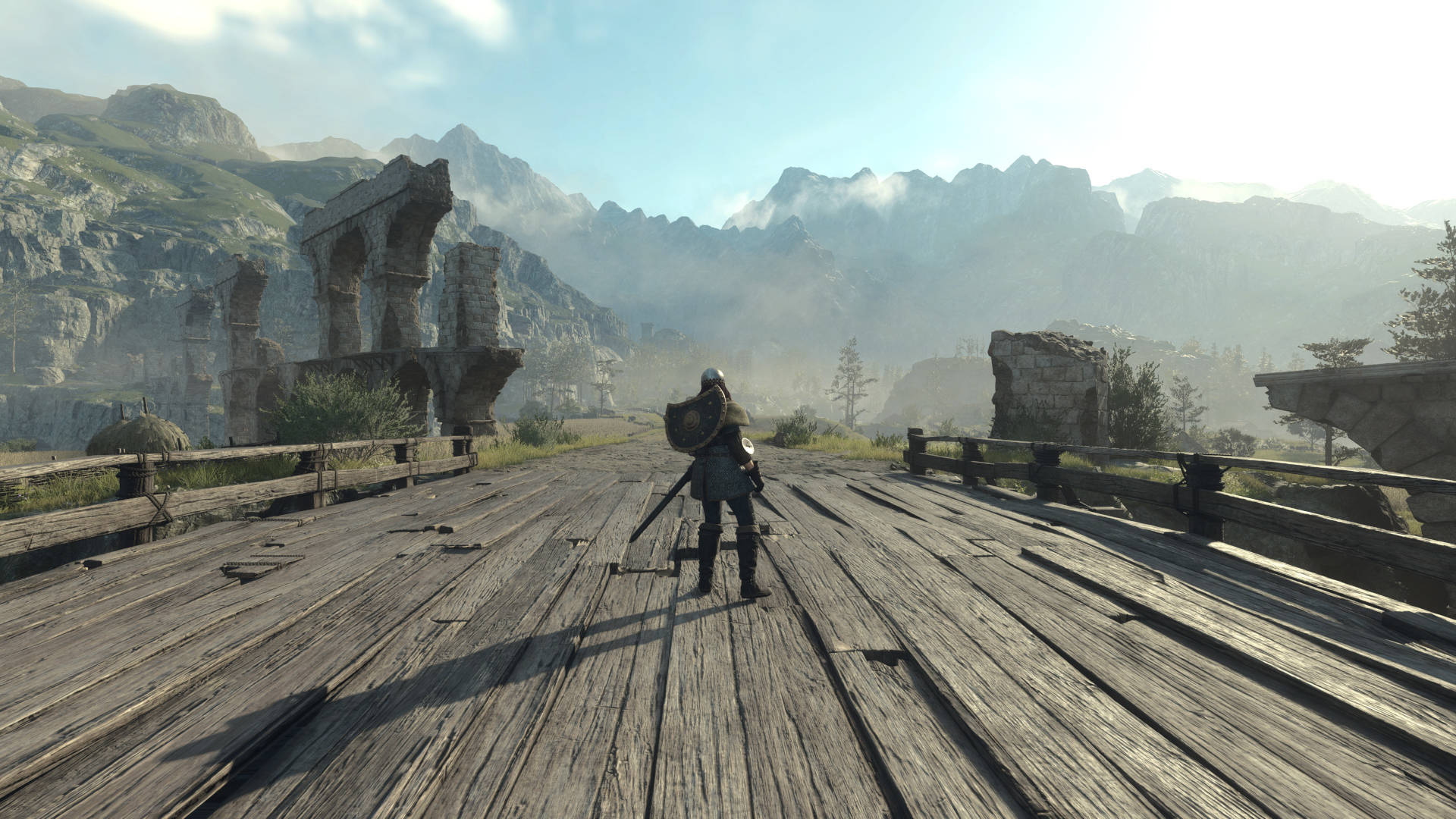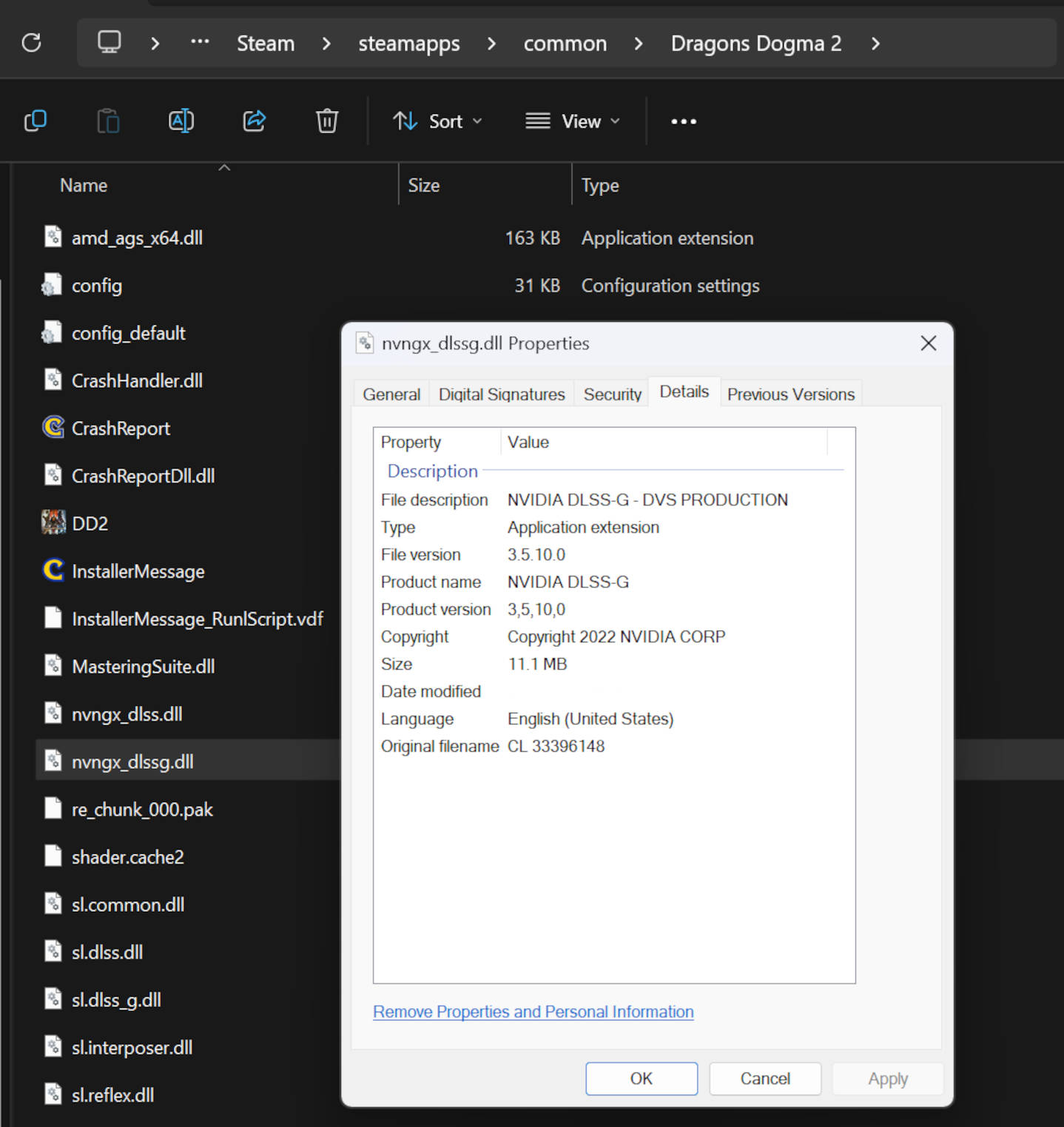Dragon's Dogma 2 already has the file for DLSS Frame Generation, so where is the feature?
And the game offers FSR 3 but there's no AMD FG either.

Unless you've been purposely ignoring all of the news surrounding Dragon's Dogma 2, you can't have missed the fact that the game's performance is somewhat poor. Although it's almost entirely CPU-limited in the main city, the open world is still pretty demanding on graphics cards and it's begging for a spot of upscaling and frame generation to give it all a handy boost. The former is already in the game but where's the latter, especially since the DLSS 3 file for frame gen is in the installation folder.
And it's not some ancient, early release of DLSS either. It's actually the latest 3.5 version (specifically 3.5.10), although it has been in flight since October of last year. The same is true of the upscaling file for DLSS Super Resolution and the latency-reducing Reflex, so clearly Capcom has implemented the full DLSS 3.5 package into Dragon's Dogma 2.
AMD doesn't use external dll files for its upscaling and frame generation system, FSR 3, but it is part of the game. Or at least the upscaling is, but just as with Nvidia's AI-powered frame interpolator, there's no sign of the AMD version in DD2.
As to why neither system is present in the review sample of Dragon's Dogma 2 I examined for performance, that's unclear. It could be that Capcom were aware of the fact that on weaker hardware the game struggles to perform much beyond 30 fps, and frame generation ideally needs a baseline of 60 fps to prevent too much lag being injected into the whole pipeline.

But Dragon's Dogma 2 is no twitch-shooter type of game, even in the middle of the most frenetic combat moments. Your character and camera don't move especially quickly so it wouldn't be too much of an issue if everything felt a tad more laggy with frame gen enabled. It would certainly benefit stronger gaming PCs that can run the game consistently enough at 60 fps (city area notwithstanding).
Perhaps it's a visual quality issue, as the use of upscaling makes the visuals rather blurry, especially in Performance mode. It doesn't matter whether you use FSR or DLSS, everything is given a 1990's fuzziness, though full use of the game's image sharpening setting does help make it more palatable. Though that does depend on the initial resolution you use, as while upscaling is serviceable with 4K for example, it makes a mess of the visuals if you use 1080p.
Upscaling improves performance by significantly reducing the resolution at which the main part of the frame is rendered at. Fewer pixels means less work for the GPU to handle, which means it can churn the frame out quicker. Before it appears on your monitor, the frame is then upscaled to the screen's resolution, before the user interface or HUD is applied.
Keep up to date with the most important stories and the best deals, as picked by the PC Gamer team.

Best CPU for gaming: The top chips from Intel and AMD.
Best gaming motherboard: The right boards.
Best graphics card: Your perfect pixel-pusher awaits.
Best SSD for gaming: Get into the game ahead of the rest.
FSR then applies some shader magic to tidy the image up, whereas DLSS runs an AI algorithm instead. But if your monitor only supports 1080p and you try to use an aggressive level of upscaling, the frame will be rendered from too few pixels, and no amount of machine learning can fix that.
Frame generation uses previous rendered frames to interpolate new ones, so if they look horrible, then the generated ones will look potentially even worse. And who'd want that?
Of course, just because one file is in an installation folder doesn't mean that the developers ever plan to use it. They could have simply just bundled the whole DLSS 3.5 package in with the game for the sake of simplicity. And in the case of FSR, the team could be holding off to use AMD's new 3.1 version that allows upscaling and frame generation to be completely decoupled.
Anyway, whatever the reason for frame generation not being present, I have no doubt that Capcom will include it as an option in a later patch. We'll probably have to wait until the developers have fixed all of the main performance issues first, though.

Nick, gaming, and computers all first met in 1981, with the love affair starting on a Sinclair ZX81 in kit form and a book on ZX Basic. He ended up becoming a physics and IT teacher, but by the late 1990s decided it was time to cut his teeth writing for a long defunct UK tech site. He went on to do the same at Madonion, helping to write the help files for 3DMark and PCMark. After a short stint working at Beyond3D.com, Nick joined Futuremark (MadOnion rebranded) full-time, as editor-in-chief for its gaming and hardware section, YouGamers. After the site shutdown, he became an engineering and computing lecturer for many years, but missed the writing bug. Cue four years at TechSpot.com and over 100 long articles on anything and everything. He freely admits to being far too obsessed with GPUs and open world grindy RPGs, but who isn't these days?

